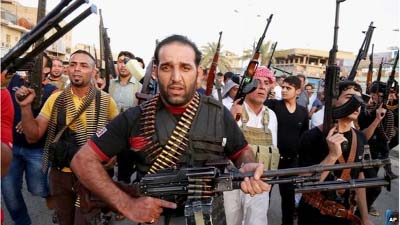
BBC Online :
US President Barack Obama has said he will take several days to decide what action to take over Iraq, but that no US troops will be deployed there.
Any US involvement “has to be joined by a serious and sincere effort by Iraq’s leaders to set aside sectarian differences”, he said.
In recent days Sunni insurgents have seized the cities of Mosul and Tikrit, and are moving closer to Baghdad.
Iraq’s most senior Shia cleric has issued a call to arms to fellow Shias.
The message from Grand Ayatollah Ali al-Sistani, which was read out at Friday prayers in Karbala, said: “Citizens who are able to bear arms and fight terrorists, defending their country and their people and their holy places, should volunteer and join the security forces to achieve this holy purpose.”
There are reports that thousands have already joined Shia militias, which could play a crucial role in the defence of Baghdad, says the BBC’s Richard Galpin who is in the city.
The Sunni insurgents – from the Islamic State in Iraq and the Levant (ISIS) – regard Iraq’s Shia majority as “infidels”.
Meanwhile, Iran’s president Hassan Rouhani said on Saturday that Tehran was ready to help Iraq, but ruled out sending Iranian troops to battle extremist Sunni Islamists.
“Iraq is Iran’s neighbouring friend and Iran will certainly help the Iraqi government on the basis of international rules and frameworks… So far the Iraqi government has not asked for help yet, but if they do we will certainly help them,” he told the BBC.
Mr Obama told reporters that ISIS represented a danger not just to Iraq and its people but that “it could pose a threat eventually to American interests as well”.
Barack Obama: “The US will do our part, but understand that ultimately it is up to the Iraqis as a sovereign nation to solve their problems.”
He said Iraq needed additional support to “break the momentum of extremist groups and bolster the capabilities of Iraqi security forces”.
Iranian President Hassan Rouhani called Mr Maliki on Thursday and promised that Shia-majority Iran would “not allow the supporters of terrorists to disrupt security and stability of Iraq through exporting terrorism to Iraq”.
According to unnamed sources in both the the Wall Street Journal and CNN, Iran has already sent several elite units of its Revolutionary Guard to help Iraq, but other sources say Iranian officials have denied their involvement.
Amid the continuing uncertainty, the price of Brent crude spiked on Friday.
This was not the swift deployment of military force that some critics in Washington want. But it was a tough-minded, even impatient, statement of the president’s approach – as he put it at West Point: “Because we have the best hammer does not mean that every problem is a nail.”
He said American sacrifices had given Iraqis the chance to claim their future – but they, or their leaders. hadn’t seized it. He almost mocked the Iraqi army for running away, castigated the Government for not trying hard enough to overcome the sectarian divide and made it clear that the US would not be “dragged in” to a return to Iraq.
There’s a world view behind this statement that some Americans and others in the West may find uncomfortable – that US military might, as great as it is, cannot impose solutions on a complex world – behind his words the strong feeling that changing Iraq by force has already been given more than a chance. It failed. And it mustn’t be repeated.
After taking Mosul late Monday, and then Saddam Hussein’s hometown of Tikrit, the Sunni militants pressed south into the ethnically divided Diyala province.
On Friday, they battled Shia fighters near Muqdadiya, just 80 km ( 50 miles) from Baghdad’s city limits.
Reinforcements from both the Iraqi army and Shia militias have arrived in the city of Samarra, where fighters loyal to ISIS are trying to enter from the north.
Mr Maliki is also reported to have travelled to the city for a security meeting.
In Geneva the UN human rights chief, Navi Pillay, has warned of “summary executions and extrajudicial killings” and said the number killed in recent days may be in the hundreds.

